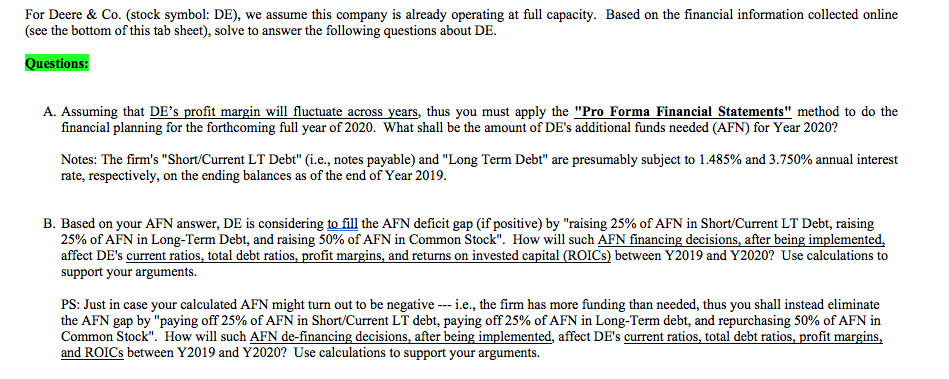
For Deere & Co. (stock symbol: DE), we assume this company is already operating at full capacity. Based on the financial information collected online (see the bottom of this tab sheet), solve to answer the following questions about DE. Questions: A. Assuming that DE's profit margin will fluctuate across years, thus you must apply the "Pro Forma Financial Statements" method to do the financial planning for the forthcoming full year of 2020. What shall be the amount of DE's additional funds needed (AFN) for Year 2020? Notes: The firm's "Short/Current LT Debt" (i.e., notes payable) and "Long Term Debt" are presumably subject to 1.485% and 3.750% annual interest rate, respectively, on the ending balances as of the end of Year 2019. B. Based on your AFN answer, DE is considering to fill the AFN deficit gap (if positive) by "raising 25% of AFN in Short/Current LT Debt, raising 25% of AFN in Long-Term Debt, and raising 50% of AFN in Common Stock". How will such AFN financing decisions, after being implemented, affect DE's current ratios, total debt ratios, profit margins, and returns on invested capital (ROICs) between Y2019 and Y2020? Use calculations to support your arguments. PS: Just in case your calculated AFN might turn out to be negative --- i.e., the firm has more funding than needed, thus you shall instead eliminate the AFN gap by "paying off 25% of AFN in Short/Current LT debt, paying off 25% of AFN in Long-Term debt, and repurchasing 50% of AFN in Common Stock". How will such AFN de-financing decisions, after being implemented, affect DE's current ratios, total debt ratios, profit margins, and ROICs between Y2019 and Y2020? Use calculations to support your arguments. For Deere & Co. (stock symbol: DE), we assume this company is already operating at full capacity. Based on the financial information collected online (see the bottom of this tab sheet), solve to answer the following questions about DE. Questions: A. Assuming that DE's profit margin will fluctuate across years, thus you must apply the "Pro Forma Financial Statements" method to do the financial planning for the forthcoming full year of 2020. What shall be the amount of DE's additional funds needed (AFN) for Year 2020? Notes: The firm's "Short/Current LT Debt" (i.e., notes payable) and "Long Term Debt" are presumably subject to 1.485% and 3.750% annual interest rate, respectively, on the ending balances as of the end of Year 2019. B. Based on your AFN answer, DE is considering to fill the AFN deficit gap (if positive) by "raising 25% of AFN in Short/Current LT Debt, raising 25% of AFN in Long-Term Debt, and raising 50% of AFN in Common Stock". How will such AFN financing decisions, after being implemented, affect DE's current ratios, total debt ratios, profit margins, and returns on invested capital (ROICs) between Y2019 and Y2020? Use calculations to support your arguments. PS: Just in case your calculated AFN might turn out to be negative --- i.e., the firm has more funding than needed, thus you shall instead eliminate the AFN gap by "paying off 25% of AFN in Short/Current LT debt, paying off 25% of AFN in Long-Term debt, and repurchasing 50% of AFN in Common Stock". How will such AFN de-financing decisions, after being implemented, affect DE's current ratios, total debt ratios, profit margins, and ROICs between Y2019 and Y2020? Use calculations to support your arguments







